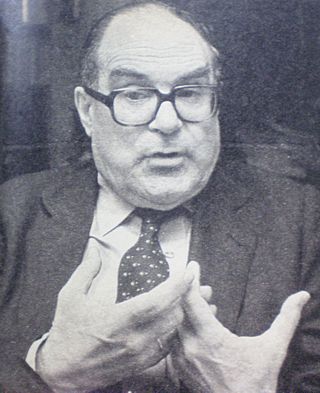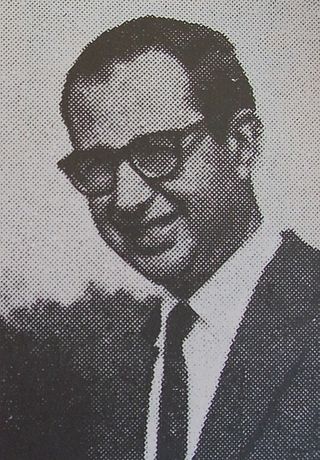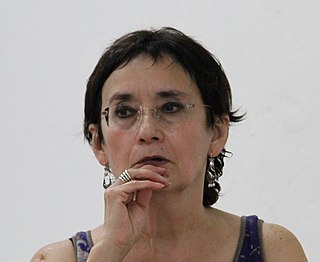
Julián Marías Aguilera was a Spanish philosopher associated with the Generation of '36 movement. He was a pupil of the Spanish philosopher José Ortega y Gasset and member of the Madrid School.

Gaucho literature, also known as gauchesco ("gauchoesque") genre was a literary movement purporting to use the language of the gauchos, comparable to the American cowboy, and reflecting their mentality. Although earlier works have been identified as gauchoesque, the movement particularly thrived from the 1870s to 1920s in Argentina, Uruguay and southern Brazil after which the movement petered out, although some works continued to be written. Gauchoesque works continue to be read and studied as a significant part of Argentine literary history.

Noé Jitrik was an Argentine literary critic.

Arturo Carrera is an Argentine poet.

Beatriz Sarlo is an Argentine literary and cultural critic. She was also founding editor of the cultural journal Punto de Vista. She became an Order of Cultural Merit laureate in 2009.

The Argentine Revolution is the name given to the civil-military dictatorship that overthrew the constitutional president Arturo Illia through a coup d'état on June 28, 1966 and governed the country until May 25, 1973. The Argentine Revolution did not present itself as a "provisional government" as in all previous coups, but rather sought to establish itself as a new permanent dictatorial system later associated with the concept of the bureaucratic-authoritarian State.

Horacio González was an Argentine teacher and essayist. Until December 2015, he was the director of the National Library of the Argentine Republic.

Roger Bartra Murià is a Mexican sociologist and anthropologist. He is the son of the exiled Catalan writers Agustí Bartra and Anna Murià, who settled in Mexico after the defeat of the democratic forces in the Spanish Civil War. Roger Bartra is recognized as one of the most important contemporary social scientists in Latin America.

Eliseo Verón was an Argentine sociologist, anthropologist and semiotician, and professor of communication sciences at Universidad de San Andrés. His work is known mainly in Spanish and French-speaking countries.

Ricardo Forster is an Argentine philosopher, historian of ideas and political critic.

The Labour Gathering Party was a political party in Argentina, led by José Penelon. It emerged from a dissident wing of the Communist Party of Argentina in the late 1920s. The party would exist for decades, mainly based in Buenos Aires, but its influence waned over the years.
Omar Acha is an Argentine historian and political essayist. He is a researcher at the Consejo Nacional de Investigaciones Científicas y Técnicas and also at the Centro de Investigaciones Filosóficas (Argentina). He teaches Philosophy of History at the Universidad de Buenos Aires. He was also a member of the editorial board of Herramienta. Revista de Teoría y Crítica Marxista, published in Buenos Aires.
Aurelia Del Carmen Guarini is an Argentine anthropologist, teacher, film director, and film producer specializing in anthropological documentary films. She teaches visual anthropology and directs documentaries in Argentina and in Cuba. She serves on the documentary projects' evaluation committee at the National Institute of Cinema and Audiovisual Arts and participates in Cine Ojo projects.

Professor Clara Passafari de Gutiérrez was an Argentine ethnologist, anthropologist, writer and poet.

José Babini was an Argentine mathematician, engineer, and historian of mathematics and mathematical sciences.
Isa Soares is a Brazilian-born Argentine dancer and activist involved in creating awareness of the African traditions of Argentina and fighting racism against Afro-Argentine peoples. She was one of the pioneers in developing African dance interpretation and instruction in Argentina.

Rita Laura Segato is an Argentine-Brazilian academic, who has been called "one of Latin America's most celebrated feminist anthropologists" and "one of the most lucid feminist thinkers of this era". She is specially known for her research oriented towards gender in indigenous villages and Latin American communities, violence against women and the relationships between gender, racism and colonialism. One of her specialist areas is the study of gender violence.

Andrea Graciela Giunta is an Argentine art historian, professor, researcher, and curator.

Mirta Zaida Lobato is an Argentine historian, essayist, and full professor specializing in the social, cultural and political history of the world of work and gender relations in Argentina and Latin America in the 20th century. Lobato was the founder of "Área Interdisciplinaria de Estudios de la Mujer" (AIEM). She was awarded a Guggenheim Fellowship in 2006.

María Teresa Rojas Rabiela is an ethnologist, ethnohistorian, Emeritus National Researcher and Mexican academic, specializing in Chinampas of Mexico's Basin, history of agriculture, hydraulics, technology, and labor organization in Mesoamerica during pre-Columbian and colonial eras, as well as historical photography of Mexico's peasants and indigenous people. She is recognized as a pioneer in historical studies on earthquakes in Mexico. From 2018 to 2021, Rojas Rabiela was involved in the restoration of the section of the pre-Hispanic aqueduct of Tetzcotzinco, Texcoco, known as El caño quebrado.
















